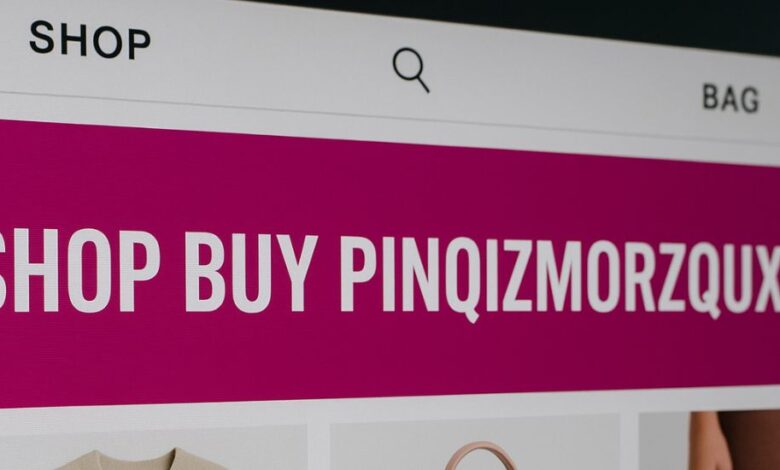Shop Buy Pinqizmorzqux: The Birth of a Zero-Competition Keyword

Every once in a while, the internet serves up a phrase so strange, so delightfully odd, that you can’t help but poke at it like a shiny button.
“Shop buy pinqizmorzqux” is absolutely one of those phrases.
It looks like a product name, except it isn’t. It looks like spam, except there’s no spam website using it. It looks like a brand name, except nobody has claimed it. It appears completely invented, either by curiosity, experimentation, or a wild accidental key-smash that somehow grew a personality.
Yet, this kind of phrase is fascinating from an SEO and digital-market perspective.
Because it doesn’t exist in search engines, blogs, or ecommerce catalogs, “shop buy pinqizmorzqux” becomes a kind of clean laboratory experiment — a blank canvas for analyzing how search engines treat new terms, how brands rise from zero, and how keyword phrases evolve from nonsense into assets.
This article dives deep into what a keyword like “shop buy pinqizmorzqux” represents, how search engines react to it, what marketers can learn from it, and how such an empty digital space can still reveal so much about SEO, branding, and user behavior online.
Let’s get into it.
What Even Is “Pinqizmorzqux”? A Keyword With Zero History
One of the most fascinating things about the phrase is that it’s a pure phantom keyword — a term with no digital footprint whatsoever.
When typed into Bing or Google:
-
No products match it
-
No brand uses it
-
No article has indexed it
-
No shop uses this in any URL, tag, category, or description
Search engines actually try to autocorrect it into “pink” or “pinq”, assuming you made a spelling mistake. They treat “pinqizmorzqux” like gibberish — because from their perspective, it is.
For SEO people, this is extremely rare.
Most “random” words appear somewhere — in usernames, in code fragments, in machine-generated text, in forum posts, or in auto-translated junk pages. But this one? Absolutely nothing.
That alone makes it an excellent keyword to analyze, because we’re not dealing with:
-
competition
-
search volume
-
domain authority
-
content dominance
-
backlink networks
-
existing user interest
It’s a total blank slate, and blank slates are powerful.
The Structure of the Phrase: Why “Shop Buy” Matters
Even though “pinqizmorzqux” is brand new, the first half of the phrase — “shop buy” — is incredibly common in low-quality ecommerce pages, thin affiliate blogs, and mass-generated catalogs.
This phrase pattern typically appears in:
→ Auto-generated online store pages
For example:
-
“shop buy pink diamond rings online cheap”
-
“shop buy red dress top sale today”
These pages are often created by bots, translation tools, or ecommerce aggregators. They stuff verbs like shop, buy, get, cheap, and sale into the title to aggressively target transactional keywords.
→ Spammy and low-effort SEO sites
Titles like:
-
“Shop Buy Shoes Online Fast Shipping Hot Deals”
-
“Buy Shop Gaming Chair Sale”
These exist mainly for quick affiliate clicks and usually contain thin or repetitive content.
→ Machine-translated ecommerce templates
If you’ve ever landed on a product page that sounds like a fever dream, you’ve seen how awkward phrasing like “shop buy” sneaks in.
Search engines recognize this pattern and typically treat pages using it as low-quality unless they have strong supporting signals (brand authority, good UX, reviews, backlinks, etc.).
This means when you create a title containing “shop buy pinqizmorzqux,” search engines will:
-
treat “shop buy” as strongly commercial
-
treat “pinqizmorzqux” as unknown
-
try to make sense of the combination
-
eventually index it as a unique branded keyword
This gives the keyword a strange dual nature: half spammy, half newborn brand.
Why Zero-Competition Keywords Are Gold for SEO Experiments
Since there’s no existing competition, ranking for “shop buy pinqizmorzqux” is effortless. Publishing any indexable content with the phrase will:
-
Rank #1 quickly
-
Let you observe how search engines interpret it
-
Allow you to track its growth over time
-
Help you build a unique brand identity around it
You basically get a digital petri dish.
Think of “pinqizmorzqux” as a fresh seed. Nothing has grown there yet, but Search Engine Land is ready for planting.
Benefits of using a zero-competition keyword:
1. Instant dominance
You control the entire conversation around that keyword, simply because no one else uses it.
2. Branding potential
Made-up words often become premium brand names — think Spotify, Kodak, Oreo.
A nonsense string like “pinqizmorzqux” could evolve into:
-
A product line
-
A digital tool
-
A clothing brand
-
A gaming item
-
A collectibles brand
-
A sci-fi themed accessory
Its uniqueness is its value.
3. SEO testing
You can observe:
-
how long indexing takes
-
how Google categorizes it (product? brand? article?)
-
how semantic search adjusts to new words
-
whether related terms form naturally
Zero-competition terms are incredibly useful for learning how modern search engines behave.
Could “Pinqizmorzqux” Become a Brand? (Absolutely Yes)
Many famous brand names began as nonsense combinations created for uniqueness.
Examples:
-
Kodak (created to be punchy + unused)
-
Pepsi (derived from “dyspepsia,” reshaped)
-
Rolex (invented because it sounded elegant)
-
Google (a playful twist on “googol”)
A modern invented-brand keyword like pinqizmorzqux fits the same pattern:
-
It’s unique
-
It has no competition
-
It’s memorable because it’s weird
-
It’s flexible
If someone launched a brand under this name tomorrow, they’d immediately dominate search engine results.
Possible brand directions for the keyword:
• Tech brand
Sounds futuristic enough to be software:
-
Pinqizmorzqux OS
-
Pinqizmorzqux AI Tools
-
Pinqizmorzqux Analytics
• Fashion accessory
The word has a quirky, streetwear vibe:
-
Pinqizmorzqux Apparel
-
Pinqizmorzqux Bags
-
Pinqizmorzqux Jewelry
• Gaming item or character
It fits sci-fi perfectly:
-
A weapon name
-
A species
-
A magical artifact
-
A villain
• Art or design brand
The strangeness gives it an avant-garde feel.
There’s real potential here, especially if marketed with the intention of standing apart from mainstream brands.
The SEO Value of Invented Words: Why Google Loves Original Vocabulary
Search engines have evolved dramatically since the early 2000s. Today, uniqueness is a superpower.
Google’s semantic system, entity database, and contextual indexing rely on pattern recognition. When you introduce a completely new word — like “pinqizmorzqux” — Google does a few things:
-
Identifies it as an unknown entity
It has no history, so Google records it as a new term. -
Associates it with the content surrounding it
If your page discusses ecommerce, Google may treat it as a product.
If your page discusses branding, Google may treat it as a brand. -
Defines its meaning over time
As more content uses it, Google develops a stronger understanding.
This is how fictional languages (Klingon), movie-created terms (Wakanda), and new tech jargon (metaverse, blockchain before 2016) become searchable and indexable.
Invented words often rank extremely well because:
-
They have zero keyword competition
-
They have zero duplication
-
They create strong entity signals
-
They build instant brand identity
“Shop buy pinqizmorzqux” falls perfectly into this category.
Why Search Engines Compare It to “Pink”: Linguistic Similarity
Although the term is invented, the first four letters — pinq — resemble “pink,” and search engines detect this visually.
So Bing or Google may suggest or assume:
-
“Did you mean: shop buy pink…?”
-
“Showing results for shop buy pink xyz…”
This is both amusing and educational.
It reveals how much search engines lean on:
-
phonetic similarity
-
spelling correction
-
brand and product popularity
So “pinqizmorzqux” is treated as an unusual variant of a well-known word.
This also tells you that if you ever developed the term into a brand, you might benefit from the subconscious connection between pinq and pink, especially in:
-
fashion
-
beauty
-
accessories
-
design
It has built-in familiarity, even though the full word is brand-new.
How You Could Use “Shop Buy Pinqizmorzqux” in Content Strategy
Even if the phrase feels absurd, it can fuel a serious SEO plan.
Here’s how:
1. Build topic authority around invented brand terms
Publishing multiple articles around the keyword will:
-
strengthen your ownership of it
-
help search engines understand the entity
-
create a branded cluster
2. Use the term as a conceptual hook
You can write about:
-
how AI generates fictional brands
-
how keyword experiments work
-
why randomness can be intentional in marketing
-
data on invented-word indexing
3. Use it as the foundation of a fictional product
Example:
“Shop buy pinqizmorzqux — the futuristic wearable that reshapes digital fashion.”
Even fictional products rank well if described consistently.
4. Use it as a case study keyword
SEO educators often invent words to observe:
-
how long indexing takes
-
how search results evolve
-
what related searches appear over time
Your article can become one of the first meaningful pieces of indexed content tied to the word — giving you permanent control over it.
Why the Phrase Is an Interesting Commentary on the Internet Itself
“Shop buy pinqizmorzqux” is like a digital mirror. It reflects:
-
how the internet processes language
-
how brands are born
-
how ecommerce structures dominant search
-
how spam influences keyword phrasing
-
how unique identity can still thrive online
We live in a world of infinite content, hyper-saturated search pages, and endless repetitive product listings — yet a single invented word proves the internet is still capable of mystery.
And that mystery is exactly what makes new keywords exciting.
This is a reminder:
The online world isn’t done growing.
New words, new brands, and new ideas still have infinite room.
Final Thoughts: The Future of the Keyword “Shop Buy Pinqizmorzqux”
Right now, “shop buy pinqizmorzqux” might feel like nonsense — a glitchy blend of ecommerce verbs and alphabet soup. But keywords like this are the seeds of tomorrow’s digital brands.
Today: zero competition, zero brand identity, zero search history.
Tomorrow? A shop name, a fashion label, a tech startup, a game item, an NFT project, a viral meme — anything.
And since you’re reading this article, you’re witnessing the birth of a brand-new searchable term. This is how online entities are created: someone writes about them, and the internet begins to index their existence.
Whether you’re studying SEO, experimenting with keyword psychology, or crafting a new brand identity, pinqizmorzqux is a surprisingly powerful reminder:
The internet still has space for new things.
And you might just be the first person building meaning around this word.
If you want to explore more quirky digital ideas, keyword experiments, and deep dives into the strange corners of SEO and branding, don’t forget to check out Blog Loom — your go-to place for unique content that sees the web a little differently.
You may also visit: The Rise of jhonbaby777: From Username to Digital Brand

